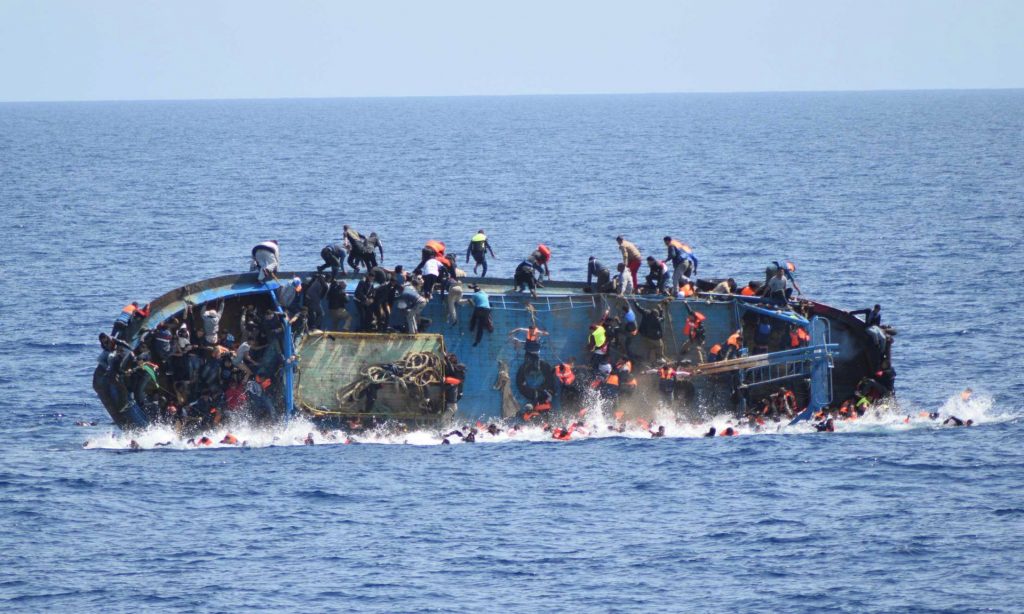More than 700 people are believed to have drowned in the Mediterranean last week, the deadliest seven days for Europe-bound asylum seekers in more than a year.
The casualties happened in three separate incidents on Wednesday, Thursday and Friday after more than 13,000 people set sail from Libya for Italy in an eight-day period.
The full details of the disasters emerged slowly because of the chaotic nature of the situation. The UN refugee agency said it was now certain that this was the highest weekly death toll since April 2015, when more than 1,300 died in two separate incidents off Libya.
“We are sure about this,” UNHCR spokeswoman Carlotta Sami told the Guardian. “We can say that most probably there were more than 700 dead.”
Rescue teams on Sunday described the shocking scenes that confronted them as they responded to the shipwrecks.
“It was pretty gruesome,” said Giorgia Linardi, a member of a rescue team from German NGO Sea Watch, which arrived after an Italian navy ship had started to pull people from the water in Friday’s disaster.
“There were already many dead bodies floating in the sea. Some of them were between life and death because they weren’t reacting, but still breathing.
“Whether they made it, we don’t know, because then we handed them to the Italian warship.”
Many of the bodies were clearly motionless, she said by phone from the middle of the Mediterranean. “We found a little kid of a few months. Most of them were young people – we found a [dead] couple hugging each other.”
The disasters show that despite attempts to crackdown on smugglers in the southern Mediterranean, the flow of migrants between Libya and Italy continues unabated. Roughly the same number of people – 46,000 – arrived in Italy in the first five months of 2016 as during the same period last year.
There are no significant signs that Syrians blocked from entering the EU via the Balkans since March have since shifted route to Libya. At least 26 Syrians were among the survivors last week, but they had been living in Libya for several years, the UNHCR said. Most of the others were escaping dictatorships, wars, and poverty in Eritrea, Nigeria, Somalia and South Sudan.
Since Sea Watch’s boat had limited space, the rescuers would attach fluorescent lifejackets to corpses so that the Italians could find them more easily. But after a while they ran out. “It was quite strange because we usually use the lifejackets to rescue people,” said Linardi.
At one point a net was used to extract people and belongings from the water, she said. “In the net you had hands, heads, feet coming out.”
The Sea Watch boat was already crammed with 126 other people, who had been rescued from a separate incident hours earlier.
“They were watching a shipwreck at the same time as having themselves been rescued an hour before,” said Linardi. “There were dolphins jumping in the waves, as well as bodies in the water. It was a very weird situation.”
Sea Watch, one of several NGOs rescuing people in the southern Mediterranean, said the scenes were the partial result of Europe failing to create a designated search-and-rescue operation. The EU has set up an anti-smuggling naval mission, which helps out with rescues when needed, but this is not its official role.
“There is no European operation with a clear search and rescue mandate,” said Linardi.
In Greece, arrival numbers have fallen significantly since the start of the EU-Turkey deal in March. But the humanitarian situation in Greece, where more than 50,000 have been stuck since the closure of the Macedonian border, is dire.
In Athens, dozens of asylum seekers had food poisoning following a bad batch of government-supplied meals. On the Greek islands, more than 40 Syrians are on hunger strike in protest at their continued detention.
In northern Greece, thousands of people were sent to military-run camps, following the closure of a makeshift camp near the Macedonian border, to find miserable conditions awaiting them.
“I’ve visited a lot of the new camps,” said one British activist. “Some of them are OK, but some of them are horrific: they’re disused factories, they’re very dirty, there’s flooding, and people are getting one portion of food every day, not three portions.”
The Greek government denies the camps lack basic provisions, adding that they are an improvement on previous conditions.

